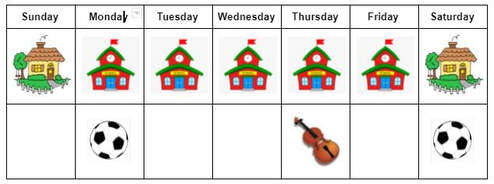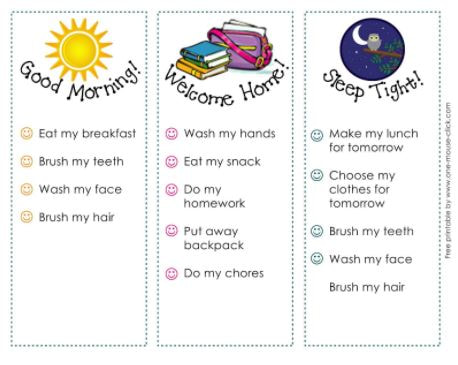|
By Beth Cieslak, PLPC
New schedules and routines can be exciting, but also come with a variety of mixed emotions for all ages. We may be excited about a new opportunity, but also unsure and anxious about the unknown aspects. As adults, we utilize calendars, phone reminders, and sticky notes to keep track of the many things going on in our lives. Kids and teens also benefit from these supportive strategies. Visual schedules consisting of pictures and/or simple words are effective tools to meet this need. Visual schedules help to increase confidence and minimize anxiety. Compliance resistance, power struggles, and prompt dependency may also decrease with the use of visual supports. Sheri Klugmann, Ramapo for Children Senior Parent Educator, explained that visuals help children to:
Including children and teens in the planning and preparation of visual schedules builds ownership of ideas and promotes success. What aspects of the day/week are creating the most stress or uncertainty? Would you like to write or draw pictures to illustrate? Can we take photos of the places in our routine, such as home, school, activities? Tech savvy families may enjoy creating visuals utilizing online image searches. Accessibility to these visual supports is essential. Post visual schedules where they are easily seen, such as on the refrigerator or bedroom wall. Place an additional schedule inside their backpack for access away from home. Teens may prefer to create and access visual schedules on technology devices such as a cell phone. Next comes teaching and practicing use of the visual schedule. Assist the child/teen in referring to the schedule for information. Some visuals will require identification of the place they are at on the schedule. Small binder clips or clothespins work well for pointing to a specific area. Another idea is to mark off completed tasks or days in the schedule. Here are some examples of visual schedules to get you started. I wish you and your family the very best as we embark on the new school year! Beth Cieslak, PLPC is under the clinical supervision of Pam Lueders, LPC (MO#2015026733)
0 Comments
 By Emily Kircher-Morris, LPC A child keeps kicking his brother's car seat, even after his mom has asked him to stop. The class clown keeps interrupting the teacher with off-topic and mildly inappropriate comments. A preteen girl crumples her homework and dramatically hides her face in her arms on her desk. A young boy has a meltdown because he is told they are having cookies instead of ice cream for dessert. When trying to figure out what is behind these problematic behaviors, parents and teachers may come to the conclusion the child is engaged in negative attention-seeking. They come to the conclusion that the best response is to ignore or give a negative consequence for the behavior. Many people feel that attention-seeking behavior is a negative trait. The attention the child is seeking is unearned and the result of a child being overly emotional and dramatic. The reaction may be to ignore the behavior or even give a negative consequence to the child. I'd like to suggest a different way to look at attention-seeking behavior. If we consider all behavior to be communication and ask ourselves, "What is the child needing from this interaction?" we may find some ideas of how to handle the behavior. Let's reframe attention-seeking as reassurance-seeking. Their behavior is saying: Am I alone? Do you love me? Am I worthwhile? Even if I act this way, will you stick with me? We all need attention once in a while. We may seek it in positive ways, through accomplishments and helping others. The reassurance we get from those acknowledging us can keep us going. Sometimes kids don't have the language or emotional regulation skills to get their needs met in the most convenient way for us. But, when we remind ourselves the attention-seeking is really reassurance-seeking, we build our relationship with the child and can help them learn more appropriate ways to seek that reassurance from us in the future.
For example, my son refused to wear a bike helmet more than once. Instead of taking his bike away, he had to research and find information about the risks associated with bike helmet safety and regulations. It was time consuming. I had to help him through the process. It also kept him from his preferred activities, but, it was engaging. It allowed him to create new connections in his awareness of the topic. It was much more effective than me lecturing him, too. And when he was able to share his learning, he felt proud of his work instead of ashamed of his mistake.
The downside of restorative consequences it takes effort, time, and creativity on the part of the parent. However, the long-term benefit in learning and the relationship it fosters between you and your child will be worth the effort.  By Caitlin Winkler, PLPC Backpack, check. School supply list, check. New clothes, check. Haircut, check. It’s that time of year. Saying good-bye to summer and hello to school is getting closer, if not already here, and you’ve checked (or almost checked) all the boxes on your to-do list. Each year we do our best to prepare our child for a new school year. Something we often fail to discuss is the need to be mentally and emotionally ready as well. School brings a whole new set of trials each year. From academic challenges, teacher meetings, to tears over friendships, missing the bus, and the excitement of starting something new, this school year is bound to have its ups and downs. How can you help get ready for those tough times? Five Tips to Prepare Mentally and Emotionally for the New School Year: 1. Meet physical needs first. If you can remember Maslow’s hierarchy of needs from Psychology class, basic physical needs are the foundation upon which everything else is built. It is hard to get up for the bus, be prepared for a test, and meet obligations at school if you’re not sleeping well, not getting adequate nutrition, and do not have a secure and safe place to live. 2. Talk to your child about their thoughts and feelings. You could ask: What are you looking forward to? What are you nervous about? What are you excited to learn? Who are you looking forward to meeting? What are some concerns you have? How will this year be different than last year? Your child may surprise you with his or her answers. Validate their feelings and listen to their concerns without passing judgment or minimizing their thoughts. It is important for them to feel heard and understood. 3. Be aware of your child's struggles. Does your child have test anxiety? Is making new friends scary or really hard? Does your child struggle with having positive behaviors at school? Think about your child's strengths and weaknesses. As parents, it can be easy to only want to see the great things about our child, but the reality is, our children are not perfect. Everyone struggles with something. Helping your child prepare, work through, and persevere through a challenge or limitation is so important. Connecting your child to resources, such as tutoring, social skills groups, and counseling can make a huge difference. Be proactive in reaching out for help. 4. Give them the power. Many people pass blame and fault to others. Even as adults, we do this. But, something so vital for our children to learn is the fact, "I can control myself- my behaviors, my thoughts, my attitude, my words." They have the power to control themselves and are ultimately responsible and accountable for their actions. Once they recognize and learn this, they can tackle any challenge thrown their way. They can handle a tough teacher, an argument with a friend, a low grade on an assignment, or not making the team. As children and as adults, we choose our thoughts, whether they are positive or negative, and our actions are born from those thoughts. Positive thinking leads to positive feelings and positive behaviors. 5. Prioritize your schedule. We often expect ourselves and our children to keep up a crazy, fast-paced schedule. Many children are exhausted not just physically, but mentally and emotionally as well from the demands on our calendars. Cutting back on sports practices, extracurricular activities, and outside commitments may be necessary. Our children need time to just be kids- time without structure, time-lines, and expectations placed on them. Make time to play outside, laugh as a family, and have a night at home. This can make a huge difference in the mental and emotional well-being of your child. Caitlin Winkler is a Provisionally Licensed Professional Counselor at Unlimited Potential Counseling & Education Center in O'Fallon. Caitlin is under the clinical supervision of Emily Kircher-Morris, LPC (MO #2012026754).  By Caitlin Winkler, PLPC When thinking about how I wanted to approach writing this blog, I really struggled with what direction to take. There is so much I wish I could share and convey in my words. I hope you find some encouragement, hope, and peace in these thoughts that come from a very personal place. International Pompe Day is recognized each year on April 15th. The day is designed to bring awareness of this rare genetic disease and hope to those impacted by it. This strange name (pronounced POM-PAY) may sound familiar. President Trump highlighted Pompe on Rare Disease Day in February during a joint address to Congress. Never before has Pompe been shared on the world stage in this way. To hear Pompe mentioned in this setting was overwhelming because of the personal relevance it brings to my family. Our son was 8 days old when we found out he failed the newborn screening for Pompe Disease. With further testing, a lot of waiting, and many tears, doctors confirmed his diagnosis on his one month birthday. At that time, we didn't know what the next year would hold: Would he survive? Would he be in the hospital all the time? Will he ever walk? How do we handle this? After further testing (again) and meetings with doctors and genetic counselors, our son is said to have a mutation which indicates a later onset of this disease, meaning he is developing and functioning as he should at this time (He just turned 3 this weekend!). However, at some point in his life, he may begin to have symptoms. This disease involves a build up of complex sugars in the body, causing muscles to breakdown and begin to lose functioning. This can lead to troubles with the heart, eating, walking, and breathing. As the disease progresses, depending on the severity and extent of symptoms, it can lead to death. We are grateful for a healthy boy, but if I let myself, I can easily worry about what tomorrow holds and if/when this disease will begin affecting my son.  As parents and adults (and kids!), it can be easy to worry about tomorrow. Whether it is a rare disease diagnosis, a financial crisis, death of a loved one, or traumatic event, life is going to throw some curve balls our way! Walking through these trials is painful, miserable, and just plain hard. So what can we do when life gets bad? Here are some things that helped me survive and tread through some of my personal storms: 1. My faith 2. Strong support system- family, friends 3. Allowing myself to grieve and cry 4. Not taking a single moment for granted - life is short 5. Finding the positive and counting my blessings 6. Taking it one moment at a time - baby steps 7. Allowing people to help and asking for help 8. Kept going - I learned I am stronger than I thought I was! 9. Sharing my story when I am able to encourage and help others I don't know what your world looks like right now. The future may be unknown and terrifying. As Christopher Robin said to his great friend Winnie the Pooh, "You are braver than you believe, and stronger than you seem, and smarter than you think."
You've got this. Learn more about Pompe Disease: https://rarediseases.org/rare-diseases/pompe-disease/ Caitlin is under the clinical supervision of Emily Kircher-Morris, LPC.  By Emily Kircher-Morris, LPC "Did you do your homework?" "Yes!" "Is your laundry in the basket?" "Yeah." "Is your room clean?" "Yep." How quickly those little impulsive lies fly! As parents, we are constantly checking and double checking on the tasks that are supposed to be completed. And, for some parents, we are consistently frustrated and challenged by the immediate dishonest response we receive. Why do kids lie? There are many reasons why a child will lie to a parent, but the simplest answer is this: They don't want to get in trouble! Then the child is caught in a double bind. They know they've lied, but what choices do they have now? They can tell the truth (and be reprimanded for lying) or they can keep up with the lie (and hope they don't get caught). Kids with executive functioning struggles and ADHD are notorious for these "speak before thinking" fibs. One simple communication tool that can help to reduce or eliminate the lying in these situations is a basic reframe of the question. Request the information in a way which a one-word answer and impulsive lie isn't an option. Instead of "Did you do your homework?" This easy change of phrase can slow down the quick response of a child trying to avoid getting in trouble. It causes them to pause and think, recognizing accountability is a key component of the request. Framing questions in this way gives your son or daughter a chance to reflect and say, "I can show you my math homework, but I still need to finish my science."
Some parents may balk. "Why can't they just be honest when I ask a simple question?" When executive functioning lags, the knee-jerk response lets out the lie before the prefrontal cortex has had a chance to process what is being asked. Parents are getting a response from the flight-fight-freeze control center (the amygdala) before the prefrontal cortex has even had enough time to figure out what the actual answer to the question is! Rephrase your question. Follow up with an accountability action. These simple steps will foster positive communication, improve your child's executive functioning skills, and reduce the stress of handling dishonesty in the parent-child relationship.  By Emily Kircher-Morris, LPC If I had a dime for every time a child or student told me that they were bored or that something was boring, I'd have enough money for a boring trip to Mexico with my husband. (Wouldn't boring be absolutely wonderful? When did my life go from abhorring boredom to it becoming a life goal? Anyway, I digress...) What I've found through many conversations with children, teens, and parents is that the phrase "I'm bored," or, "This is boring," often doesn't mean what it seems. Here is a handy guide for parents and teachers to understand the possible alternative meanings to complaints of boredom. "I don't have anything to do." Self-regulation is an executive functioning skill and this skill develops based on a child's maturity level. A child may have a million toys, a trillion games, and three-quarters of a ton of arts and crafts supplies. But, thinking about available options, prioritizing which seems the most interesting, and initiating the task are directly related to executive functioning skills and a child may need some ways to help figure out what they want to do. Creating a "menu" of options from which a child can choose or creating a "grab bag" with ideas of activities listed on individual pieces of paper can help take the decision-making out of the choice. "This isn't fun." Helping to clean the house typically isn't exactly a thrill a minute. However, if a child is busy and engaged, they aren't typically "bored." When a child complains of boredom in a school setting because a task isn't fun, parents may misinterpret it as the child saying they aren't challenged. Unfortunately, some academic tasks simply aren't all that fun, no matter what the teacher tries. Perseverance through a task that isn't fun but is necessary isn't easy for adults; helping children focus on the benefits of the outcome and monitoring their progress can help them to build this skill. "This isn't challenging enough." When a child fails to complete schoolwork and complains of being bored in class, it is possible that the work isn't challenging enough. (I should note, though, that many times the complaint is more closely related to one of the two reasons listed above.) This can go in two different directions: In one situation, the child begins acting out and getting in trouble. In the second situation, the child politely sits and completes work, compliant, bored, and not learning. Advocating for your child with the teacher for appropriate work is a necessary step for parents to take if this is the case. "This is too hard." The flip side of not being challenging enough is when a child finds a task too difficult. Sometimes a child doesn't even realize that they don't understand; they just know they don't want to attempt the task. When investigating the root cause of the "I'm bored" refrain, ask the child to restate to the task they are supposed to complete. If they are unable to explain, further instruction, modified requirements, or other accommodations may be appropriate. "I'm lonely." Parenting the child who needs to be with people can be exhausting. Suggestion after suggestion of activity may fall flat if a child is complaining of boredom because they are simply lonely. Recognize the child's need and dedicate time to "fill their bucket" with undivided attention. Negotiate with siblings who may prefer more alone time to engage with the brother or sister who thrives on attention. "I'm generally unhappy and don't know how to fix it." Sometimes kids just aren't happy. They often lack the emotional vocabulary to share how they are really feeling. Perhaps they are feeling worried, defeated, or excluded. "I'm bored" becomes a catchall for these uncomfortable feelings. Digging deeper to see what other emotions are beneath the boredom is key. It is also important to note that children and teens can be susceptible to depression and a child who is frequently uninterested in activities that at one time were engaging can be a warning sign that the child is depressed. "Nothing seems interesting." And finally, when all other options are exhausted, boredom may just be boredeom. Although there are options, none of them seem enticing. My Aunt Francine use to tell us, with unimpressed frankness, "You're not bored; you're boring." The lesson she was hoping to teach is that boredom is easily vanquished with a little creativity and imagination. Teaching kids ways to play with situations in their minds and amuse themselves in boring situations is an excellent skill to learn.  By Caitlin Winkler, PLPC The excitement of a new baby compares to almost nothing else in this world. Parents dream of the baby growing inside: what he or she might look like, the type of personality the little one may have, and all the wonderful experiences to come with the bundle of joy. What happens when what we picture as the perfect, most wonderful time of our lives turns out not to live up to our expectations? Pregnancy and postpartum mental health issues are more common than you might think. Anxiety, depression, a heavy sense of being overwhelmed, and even grief are normal after the birth of a child. There are times, however, when these feelings are more than just passing emotions. About 15% of women experience some sort of clinical mental health issue during this stage of life. These conditions can begin during pregnancy, immediately after giving birth, or within the first few months after the arrival of your new baby. They may last a few weeks or even up to a year. 5 signs you may be dealing with postpartum anxiety or depression:
Many parents can write off the intense emotions as "just adjusting" or "completely normal." Though this can be true, don't be afraid to ask your doctor or counselor questions. A new baby is a wonderful thing, but the physical, emotional, and mental demands can be extremely taxing. Seek out help! This is best for you, your partner, and your child! Self-assessment tool (Edinburgh Postnatal Depression Scale): https://psychology-tools.com/epds/ Learn more from the American Psychological Association: http://www.apa.org/pi/women/resources/reports/postpartum-depression.aspx-- Caitlin Winkler is a Provisionally Licensed Professional Counselor at Unlimited Potential Counseling & Education Center in O’Fallon. Caitlin is under the clinical supervision of Emily Kircher-Morris, LPC (MO #2012026754). By Caitlin Winkler, PLPC Becoming a more positive parent does not mean always looking on the bright side and sugar-coating life with your child. It doesn't have to be silly, corny, or uncomfortable. It also does not mean never telling your child "no." Again, there is a time and place for using these words and phrases. This style focuses your attention on the positive actions, behaviors, and thoughts your child exhibits more than the negative. It involves making positively-worded statements toward your child significantly more often than negatively worded statements. Using these toward your child encourages them to continue a wanted behavior and still maintains your authority. To break it down, positive parenting involves using positive praises and positive directives. Positive praises are used at any time. They are meant to reinforce wanted behaviors and words. Positive directives (or called positive opposites) teach your child what actions you are wanting them to have. Continuing the list from the previous post, here are six more ideas of how you can be a more positive parent to your son or daughter. 6. Be aware of positive opposites. Positive opposites teach your child what TO DO instead of limiting the message about what not to do. Instead of saying "Don't hit or kick other kids" the positive opposite would be "Keep your hands and feet to yourself." Another example would be, "Quit whining and fussing" turns into "Use your words." 7. Keep statements clear and concise. If you are giving a positively worded directive to your child, be clear about what is expected while keeping your directions from turning into a lecture. 8. Stick with it and be flexible. If this is new in your household, it may take some time for everyone to adjust. Keep working with your child and you will see them change as well as your relationship. And be flexible. Some kids are motivated by a simple "Great job cleaning your room today" while others need high-fives, positive praises, and other reinforcements. Think of what motivates your kid and use that. 9. When providing positive directives, keep your voice firm and calm. Communicate to your child you mean business while also being in control of your own words and actions. Lashing out in anger completely erases the positive message. Children learn by example, and it starts with the adults in his or her world. 10. Becoming a more positive parent seems to be geared toward younger children, however, this style can be used with older kids as well. Adjust as you see fit, but the basic ideas are the same! 11. Seek advice and help from friends, family, and professionals. No one is perfect and has this whole parenting thing figured out. It is a challenge! Reach out to people when you need some encouragement, tips, and help. Caitlin Winkler is a Provisionally Licensed Professional Counselor at Unlimited Potential Counseling & Education Center in O’Fallon. Caitlin is under the clinical supervision of Emily Kircher-Morris, LPC (MO #2012026754).
 By Caitlin Winkler, PLPC "Stop," "Don't," "No," and a list of similar words are common when correcting a child. At times, it may feel like these are the only words we know or that come out of our mouths. Every child is learning the do's and don'ts in life when they are growing up. "Stop pestering your sister," "Don't touch the hot stove," and "No yelling in the car," are all examples of basic skills we were taught. There is definitely a time and place for phrases like these, but all too often our parenting phrase repertoire mainly consists of statements telling our children what NOT to do. In the heat of the moment, it is easy to focus on what behavior you want to stop. In the long run it is not necessarily the best solution. By slightly altering our way of thinking and talking, we can help improve behavior and create a more positive environment. Think of the last thing you praised your child for doing or saying. Can you remember? Some people feel silly and robotic when praising children and this may be part of why we choose not to praise them enough. At first, especially if this is a new concept, it may feel just like that. Once you start seeing results, it will come more naturally and be more genuine. Here are the first five ideas to help you start this new style of parenting... 1. Find ANYTHING positive your child does or says and state out loud, with enthusiasm, how awesome it was. "Johnny, thank you so much for washing your hands!" or "I appreciate you arriving home before curfew, Bethany." This can especially important when you beginning this process. 2. Avoid saying "Good job" or another vague positive statement. Be specific about why you are proud of them. "Emily, you are doing a great job sharing your toys with Natalie!" 3. Use their name often when making your statement. This creates a sense of ownership and pride. 4. Show your excitement! Use your tone of voice, body language, eye contact, and actions to convey your message. Utilizing clapping, high-fives, fist bumps, affectionately squeezing a shoulder, telling everyone you meet what a great thing your child just did, or a secret handshake are a few examples of some simple tools. There are times where "throwing a party" is necessary to get the message across that the type of action or words they just had is exactly what you need from them. For example, if you are teaching responsibility by directing your child to clean up toys after playing and in the past this has been a battle, you would very enthusiastically clap, state positively worded phrases, and perhaps say "Wahoo!" or jump up and down when the child complies with your directions. For others on the outside looking in, you may look very silly, but when your child beams with pride and continues to pick up toys, it will be worth it! Get excited when your child does the right thing! 5. Make sure your positives outweigh your negatives. For every negatively worded statement, try to have ten positives. Again, even if it is a small thing, praise your child for making a great choice. Use these as a starting point for your communication with your child. Remember, these can work at any age. Stay tuned for more ideas on how to positively communicate your expectations to your child. Caitlin Winkler is a Provisionally Licensed Professional Counselor at Unlimited Potential Counseling & Education Center in O’Fallon. Caitlin is under the clinical supervision of Emily Kircher-Morris, LPC (MO #2012026754).
|
Archives
August 2021
Categories
All
|





 RSS Feed
RSS Feed